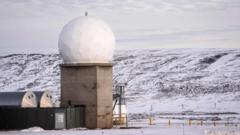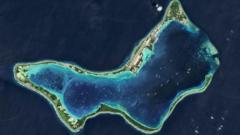Donald Trump has made provocative statements regarding the potential regaining of control over both the Panama Canal and the autonomous territory of Greenland, claiming it is essential for U.S. national security and trade interests. These comments have ignited debates about their political viability and the reactions of the countries involved.
Trump's Controversial Comments on Greenland and Panama Canal Spark Global Debate

Trump's Controversial Comments on Greenland and Panama Canal Spark Global Debate
Former President Donald Trump's recent statements about the Panama Canal and Greenland raise questions about his foreign policy approach and the implications for US relations.
In recent days, former President Donald Trump has reignited discussions surrounding his foreign policy vision by making controversial comments about the Panama Canal and Greenland. During a conservative conference in Arizona, Trump claimed Panama was imposing “ridiculous” fees on U.S. ships using the canal, leading him to suggest that the U.S. might need to take back control of the waterway. This follows a historical precedent, as the U.S. relinquished full control of the Panama Canal to Panama in the 1970s through a treaty.
Experts have interpreted Trump's remarks as part of his broader "America First" agenda, which seeks to prioritize U.S. trade and national security interests over international diplomacy. Will Freeman, a fellow on Latin American studies, noted that Trump's statements may be driven by genuine national security concerns, particularly as China has become increasingly involved in the strategic canal. The implication that the U.S. could regain control has raised eyebrows, especially since Panama's President, José Raúl Mulino, firmly stated that the canal belongs to Panama and would not be up for negotiation.
Parallel to his comments on Panama, Trump has reiterated his interest in acquiring Greenland, a Danish autonomous territory rich in natural resources and strategically important in the Arctic region. In a social media post, Trump argued that U.S. control over Greenland is vital for national security and global freedom. This is not the first time the former president has floated ideas about purchasing the territory; during his first term, he made a similar proposal that was met with outright rejection from Greenland's Prime Minister, Múte B Egede, who again reiterated that "we are not for sale."
While the U.S. maintains military interests in Greenland, especially via the Pituffik Space Base, the territory has gained significant attention due to its natural resources and implications for geopolitical dynamics, particularly with Russia's growing reach in the Arctic. Trump's fixation on both Greenland and the Panama Canal appears to reflect his consistent narrative around perceived unfair treatment by foreign partners, particularly China.
As Trump prepares to re-enter the political arena, analysts suggest that these provocative claims might reflect an intention to leverage America's global status and assert its interests through a combination of economic pressure and posturing. The implications of such strategies could potentially lead to increased tensions not only with Panama and Denmark but also with other nations involved in the intricate web of geopolitical and economic relationships in the region.
Looking ahead, it remains unclear whether Trump's renewed focus on these territories will find any workable solutions or simply exist as rhetoric to galvanize his political base. Nevertheless, the global implications of his statements are broad, hinting at a more aggressive stance in U.S. foreign relations under his leadership.



















